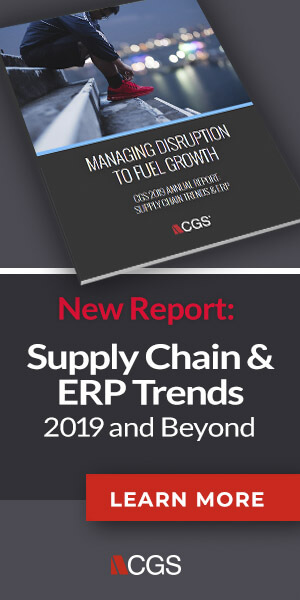Montreal based Head of Marketing Operations for CGS Quebec, formally Visual Next, Desideria Mastriaco oversees all Marketing activities for the Montreal, Quebec office.
Topics
What Does ERP Stand for and What Does it do for Apparel & Fashion Businesses Today?

ERP is an abbreviation for Enterprise Resource Planning
Enterprise Resource Planning, or ERP, is a large-scale software solution designed for businesses, both large and small. A simple definition is that ERP systems aid the flow of business processes and allow for communication between a business’s internal departments and external functions and data. Using predictive analytics, modern enterprise resource planning systems give companies insights into its real-time operations such as production, inventory management and omnichannel order fulfillment. ERP software tracks a business’s resources (raw materials, cash, employees), overhead and commitments (employee payroll, purchase orders and customer orders) for individual departments and for the company as a whole. Most ERP systems are modular. Employees can access only the modules they need in order to complete their duties while management can access all modules to both create and review data and reports. By keeping functions modular, the security of the company is better protected as a whole. ERP systems are a powerful way for companies to manage costs, service and production.

History of Enterprise Resource Planning in Retail
ERP first began in the 1990s as a way for manufacturing companies to better handle inventory management and supply/demand problems. Y2K challenges in the late 1990s identified a need for companies to streamline their computing practices; as the need for simplified computing increased, so did ERP systems. Fast-forward 25 years; cloud-based ERP solutions today serves as a unified platform, tying together several business processes and data from various sources into one central hub. ERP systems can assist accounting departments from account payables to cost management; they can help production teams calculate the bills of materials and assist with capacity estimation. The warehouse team using an ERP system can manage inventory control and supply chain management. Customer service professionals can process and track data from customer self-service interfaces to call center support, and even commissions

ERP Solutions for the Apparel & Fashion Industry
Just as all sneakers share basic features across different brands, most Enterprise Resource Planning systems share basic features, regardless of which vendor sells them. ERP systems typically have a common database that supports all applications such as accounting software right down to the customer relay management and e-commerce systems. All ERP systems collect and present data in real-time, and modern ERP systems today use predictive analytics and intelligent automation tools to increase efficiency and productivity. When selecting an ERP vendor, it is important that the ERP system can handle the unique business functions related to the given industry. For example, CGS BlueCherry ERP has been designed by industry professionals who know the apparel, footwear and accessories (AFA) market. If you are in the AFA industry, buying your ERP software from a company such as CGS will ensure your software has been designed in compliance with your industry’s best practices. When choosing your ERP system, be sure that it is the industry’s top professionals who know your business and its unique needs that have designed it. ERP systems designed with the best practices of the industry will significantly increase workplace efficiency and ease the integration of ERP systems into the workplace.
Whether your company is an international industry leader or a start-up, there is an ERP system for you. Depending upon your company’s needs, you can purchase systems with a module that will provide for every foreseeable issue or job, or you can purchase an efficient system that will still get you from point A to point B. Regardless of your company’s unique needs and budget, one thing is clear: modern businesses view ERP today as vital to their health and growth. ERP systems get companies organized, streamlined and ready to compete.
Montreal based Head of Marketing Operations for CGS Quebec, formally Visual Next, Desideria Mastriaco oversees all Marketing activities for the Montreal, Quebec office.

